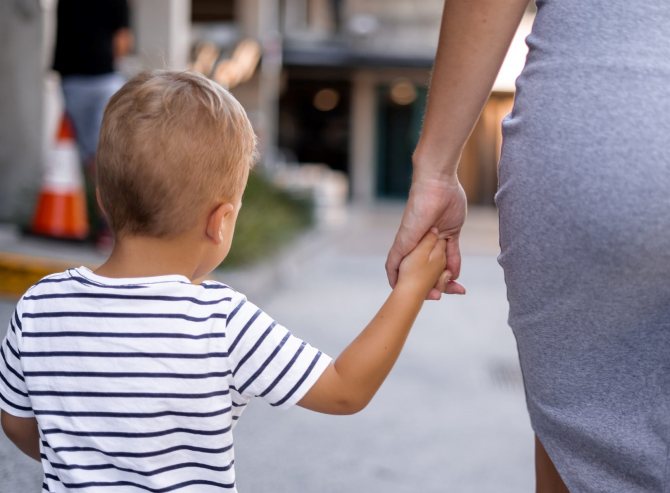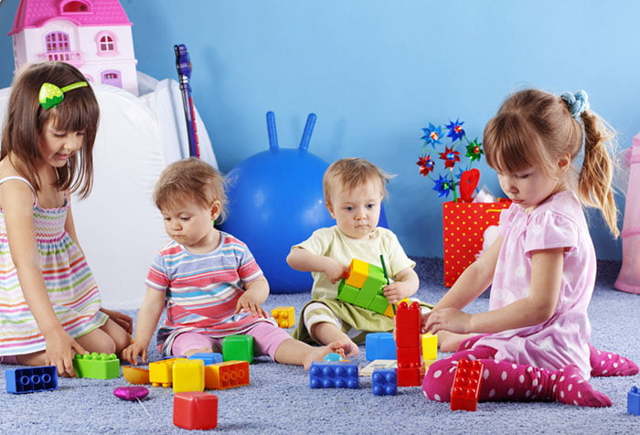When sending a child to kindergarten, parents hope that he will quickly adapt and will be happy to run there in the morning. But this does not always happen; most often, children cry or generally fall into hysterics when parting with their mother. A psychologist and teacher tell you how to avoid this.
Photo source: pexels.com
How long should adaptation ideally last?
Psychologist and art therapist Olga Goma believes that a child needs at least 2-3 months to adapt:
— We can say that adaptation has been successful if the child eats well in kindergarten, has found contact with the teacher and children, and has a good emotional state. And usually this happens no earlier than three months after the child is sent to kindergarten.
Victoria Kulinich, teacher of kindergarten No. 242 in Minsk .
— On average, it takes about one month to adapt. But sometimes it turns out that the baby only has two weeks to get used to the garden, since the mother has to go to work. If there is time, we never rush it, we look at the child’s emotional state and behavior and, based on this, determine the timing of adaptation.
What a child should be able to do before going to kindergarten
By the time the baby starts going to kindergarten, he should have an idea of discipline, know and respond to the words “can”, “cannot”, “must”. It wouldn’t hurt to teach him the words “thank you” and “please” - this will make it easier for him to interact with other children and teachers.
Teach him to carefully use a spoon and fork, drink from cups and glasses without spilling. He should be able to use paper napkins and a handkerchief, and wipe his hands and face that get dirty while eating.
Preparing a child for kindergarten also involves mastering basic personal hygiene skills. The child must be able to wash himself and brush his teeth. Develop the healthy habit of washing your hands before every meal. An important skill is to use the potty. This baby needs to be taught after he turns 1 year old.
Make sure that when he goes to kindergarten, he has clothes and shoes with Velcro, zippers and elastic bands that are comfortable to put on himself. Teach him to take off and put on his pants independently before and after using the potty or toilet with a special child seat.
How to speed up adaptation?
In order for the child to quickly and easily get used to the changes in his life, psychologist Olga Goma advises telling him about kindergarten in advance. You need to focus on positive things (that there are a lot of toys, children play together and go for walks), without embellishing reality, so that the child does not have disappointment later.
The psychologist advises that even before the start of the school year, take your child for a last walk in the garden so that he can meet the teacher, see that the children are having fun playing together, and then their mothers pick them up in the evening.
How to teach a child to communicate with peers and the teacher
If you have a lot of relatives and friends who are often in the house, your child will have fewer communication problems. But in any case, the baby will be able to learn to interact with other children by visiting playgrounds, special developmental classes, and even remaining under the supervision of kindergarten teachers in shopping centers.
Use every opportunity so that he gradually gets used to being without his mother and does not panic when another adult replaces her. To do this, you can agree with a friend and leave the baby with her for a while. It’s even better if it’s a friend of yours who also has small children.
Teach your child to promptly seek help from adults if he has difficulties. He should not be embarrassed to communicate his needs, including physiological ones. But he must understand that not every time the teacher will be able to immediately respond to his request, because the other children in the group also require attention.
Teach your child to feel like a member of a team, even if this team is your family. Let him take part in the distribution of responsibilities around the house, for example, instruct him to water the flowers or pour food for the cat. Do not deprive him of the pleasure of sitting with everyone at the table during lunch; play team games with him, involving guests in this.
What if in the garden they demand that everything be done quickly and not “stretched out”?
There can be only one piece of advice: you need to learn to defend your boundaries, says the psychologist.
— If you see that a child cannot psychologically fit into the rhythm of kindergarten so quickly, you should say softly and correctly: “I am grateful to you for wanting to help, but I consulted a psychologist / I know my child well, so I want more smoothly adapt him so that both he and I feel comfortable.” You should not undermine the authority of the teacher, but it is quite possible to insist on your own, and not agree that the child will simply be torn out of your arms, he will scream and cry, and you will leave the door. As a result, both the child and you are upset.
Should I join the group with my child?
Teacher Victoria Kulinich says that in their kindergarten, parents say goodbye to the child in the locker room and hand him over to the teacher, who takes the child to the group.
— We do not practice this option when children play in the garden with their mothers. We have a special “Mother’s School” group. Children go to it before kindergarten with their mothers, where they sculpt, draw, sing and work out in the gym. But once you start a full-fledged garden, you shouldn’t do this. Imagine if all parents want to join the group. What will happen in the room then?
Do you have to say goodbye for a long time or leave quickly “out of sight”?
Olga Goma is sure that when you bring a child into kindergarten, you definitely need to say goodbye to him, and not disappear unnoticed. If the mother simply runs away while the child turns away, his world collapses, he begins to think that the person closest to him may simply disappear.
- If you tell your child that you will be waiting for him outside the door, as mothers sometimes say, stand there or don’t promise that. Otherwise, you are simply undermining your credibility.
It is necessary to come up with a certain ritual of going to the garden or saying goodbye. This will help your child start the day on a positive note.
“For example, you can pour food into the bird feeder along the way or come up with a special handshake when saying goodbye. Follow this ritual always.

Photo source: unsplash.com
The teacher confirms that the most difficult moment is when the mother leaves. Usually, after saying goodbye, children quickly get distracted and go about their business.
- When you brought your child to the kindergarten in the morning, tell him that you will come for him at such and such a time, convince him that everything will be fine, kiss him and say goodbye. If a child cries and does not let go of his mother, the teacher should play an active role. I usually take the child in my arms, feel sorry for him, we wave to mom and go into the group. There, with the help of conversations and games, I try to distract him, to switch his attention to something else. And usually very soon the child is playing with toys and peers.
How to get your child used to kindergarten without stress?

Kindergarten is the first social environment for a small child. The beginning of his visit will inevitably cause a state of stress. After all, these are new conditions and rules, new children and adults around, the need to get acquainted and learn to communicate with others.
And also - a separation from the mother, with whom the baby is accustomed to spending almost all his time, a test of independence.
How to properly accustom your child to kindergarten, help him adapt to new conditions with the least loss for his delicate psyche?
Age imprint
One of the main conditions for a child’s successful adaptation to the children’s group is the correct age. A child can be sent to a child care institution at both 2 and 4 years old - it all depends on the capabilities of the family. Each age may have its own problems that you need to be prepared for.
For example, it is quite difficult for two-year-olds to learn to take care of themselves (eat, dress, use the potty). In addition, due to the lack of sufficient experience, they practically do not know how to establish contact with other children: get to know each other, play together, share toys.
At the age of three, children experience an age crisis when they become aware of themselves as a separate, free, significant person. Depending on the severity of the crisis, the severity of adaptation to kindergarten will also be different. But one stressful situation will inevitably overlap. Therefore, psychologists do not recommend sending children to kindergarten until the crisis subsides.
By the age of four, a child knows how to take care of himself and can make friends and play with other kids. But established habits can have an impact here: being with your mother at home, following your own routine and following your own rules. Breaking these foundations is more difficult with age.
Therefore, to select a child for kindergarten, it would be optimal to choose a period between 3 and 4 years.
Try not to combine the process of adaptation to kindergarten with other stressful situations (divorce of parents, moving to a new place, death of a loved one, birth of a youngest child).
How long will the adaptation take?
This question worries parents perhaps most of all. Everything will depend on many factors:
- baby's age;
- the presence of a parallel stressful situation;
- parents have other children;
- degree of child custody;
- the level of his dependence on his mother;
- uncertainty, anxiety of the baby;
- immunity strength;
- stability of the nervous system;
- degree of openness, sociability of the baby, etc.
Depending on these factors, adaptation can occur with varying degrees of complexity:
- Easy. It goes away on average in 3 – 4 weeks, without any particular scandals or hysterics (but not without them). The kid quickly makes friends among his classmates and learns to trust the teacher. He happily talks about everything that happened to him during the day; he is interested in going to new friends again. His speech develops quite quickly.
- Medium (most common). It can drag on for 2, and sometimes more, months. The child perceives kindergarten as a punishment for a long time, does not want to go there, wakes up in a bad mood, and is capricious. He may say that it seems normal in kindergarten, but he doesn’t want to go there. This is due, first of all, to the breaking of foundations: at home he himself established the rules of the game and norms of behavior, but here he has to reckon with others and obey.
- Severe (quite rare). It is usually typical for children with developmental delays and mental problems. But sometimes it can also manifest itself in ordinary children who grew up spoiled, did not know failure and turned out to be completely unprepared for new living conditions. Also “at risk” are children from disadvantaged families. It is extremely difficult (and sometimes impossible) to accustom such a child to kindergarten. If a child systematically does not listen to the teacher, is rude to him, ignores the daily routine of the kindergarten and the rules of behavior adopted here, you should pay close attention to this. Such a child, during a general lesson, can demonstratively do something of his own and get angry, reacting to comments; he is aggressive and hostile towards other children: he hits them, pushes them, takes away their toys. In this case, the child and mother should visit a child psychologist. If the specialist concludes that it is possible for the child to stay in kindergarten, then it is better for the child to sit out the time of correctional work with a psychologist at home. If adaptation is impossible, the baby will be sent to a special correctional kindergarten.
Who is better to take a child to kindergarten: mom, dad or grandma? Is it possible to change?
While the child is getting used to the garden, it is better for the same person to drive him, no matter whether it is mom or dad, the psychologist is convinced.
“When adapting to the garden, especially in the first three months, you should adhere to the principle of “constancy,” says Olga Goma. “This also applies to the person who takes the child to kindergarten. When the baby has already gotten used to the new stage in his life, then anyone can take him to the garden.
The teacher draws attention to the fact that only his legal representatives - mom or dad - can pick up a child from kindergarten. If your grandmother or nanny will do this, you need to write a statement.
— Sometimes children say goodbye to their dads more calmly because they are less attached to them. And it also happens that the child himself refuses to be picked up and taken to the garden by his father, asking that his mother do this.
Should I give toys from home?
At first, you can give your child his favorite toy in the garden, as this will make him calmer. The teacher, however, mentions several “buts”:
“We understand that a favorite toy is a reminder of home, it will calm the child, so we don’t see anything wrong with that. But parents should pay attention to the fact that only plastic toys that can be washed and treated can be brought into the garden. Soft toys are prohibited (according to sanitary standards). In addition, parents should explain to the child that other children can take his toy and even break it. The child must be ready for this, otherwise conflicts cannot be avoided.
"Let's make up a fairy tale"
Invite your child to come up with a fairy tale about how his favorite toy ended up in kindergarten and then act out it. An example of a fairy tale: “Once upon a time there lived a little Bunny. And now the time has come for him to go to kindergarten. Mother Bunny took Bunny to kindergarten, and she went to get some carrots. At first, Bunny was scared and wanted to cry, but he held back his tears because he didn’t want to upset his mother. Then he became friends with the teacher and the children. It turned out that the kindergarten is very interesting: here they teach how to draw, sculpt figures from plasticine, there are even music classes where children dance and sing songs. The day in kindergarten passed quickly, and in the evening Mom came for Bunny, saw that he was not crying, and was very happy. Together they went home joyful.”
Is it possible to skip kindergarten?
The psychologist is sure that you need to go to the garden on a strict schedule and every day:
— Constancy is important for a child during adaptation. It will be easier for him to adapt to the garden if he knows what awaits him and when. Of course, if you see that your child is having difficulty emotionally, you can give him an extra day off on Wednesday or pick him up from kindergarten earlier for a while. But you shouldn’t do this without good reason, since the child is already accustomed to having breakfast in the morning, then a walk, lunch, sleep, and so on. And changes in this scheme can become a kind of stress for him.
The teacher also agrees that the regime should not be violated.
“The child may begin to demand from their mother that they come to kindergarten later every time, not understanding why they came later yesterday, but today for some reason they go to 8 am. And not only requests will be used, but also tears, whims and even hysterics in order to achieve what you want. A well-established morning routine will help to avoid such problems.
How long does normal adaptation to kindergarten take?
The first visit to a preschool educational institution most often does not go unnoticed and painless. Children aged 3 to 4 years are especially sensitive to sudden changes in everyday life. There are several factors that influence how adaptation to preschool education will go and how long it will take:
- attachment to parents, especially mother;
- age;
- attitude of teachers;
- anxiety threshold;
- characteristic features of the child.
As a rule, children get used to it in mild cases - 1-2 weeks, in difficult situations up to 1 year. Psychologists distinguish three types of adaptation period:
- Easy.
- Average.
- Heavy.
The adaptation period of the mild type takes on average 14 days. After this time:
- the preschooler begins to behave normally;
- appetite is restored (after 7 days);
- sleep becomes restful (after 1.5 weeks);
- The child’s body is rebuilt, the immune system becomes stronger.
With the average type, the period of adaptation lasts from 1 to 2 months. The baby's stable sleep and appetite return to normal in an average of 30 days. His behavior changes dramatically, so there is no need to punish the little one and react violently to manifestations of character. Calmness and patience will help your baby settle into a normal lifestyle faster.
When there is a severe stage of getting used to the garden, the following deviations may appear:
- prolonged colds;
- slow development;
- sudden change of mood;
- digestive system disorder;
- the emergence of various fears;
- nervousness;
- lethargy;
- severe and long-lasting disturbance of sleep and appetite.
With this form, everything depends largely on the parents. They definitely need to seek help from specialists (psychologist, neurologist).
SANPIN has developed sanitary rules, as well as a certain daily routine for preschool children. According to them, in order for a student to develop normally and be healthy, he must:
- 2-2.5 hours of sleep during the day;
- 4 hours of walking in the fresh air;
- Three meals a day.
According to SANPIN standards, on average, children get used to preschool educational institutions within 14 days. To make the adjustment period in the garden less painful, you need to prepare them for it in advance. It is preparation that will help speed up the adaptation process to the preschool educational institution and its daily routine.
What else is important to remember?
The success of adaptation is also influenced by how parents behave after kindergarten.
“When meeting a child, spend a few minutes only with him, hug him, talk, and only then change his clothes,” the psychologist advises. - Be sure to finish your phone conversation before entering the group. Forget about everything, for three minutes nothing exists except you and your child.

Photo source: unsplash.com
If possible, it is better not to rush home after kindergarten; it makes sense to take a walk with the child, find out how his day went, what he liked, who he played with or made friends with. All questions should be asked only in a positive way, so as not to unknowingly instill fear in the child.
- Never ask a child: “At least you weren’t offended?” or “Don’t children fight?” This way you show him that it is not safe in the garden, but the baby spends there 5 days a week for 8-10 hours. In addition, this can be a good means of manipulation in the future: “I won’t go to the garden, they’ll offend me there!”








